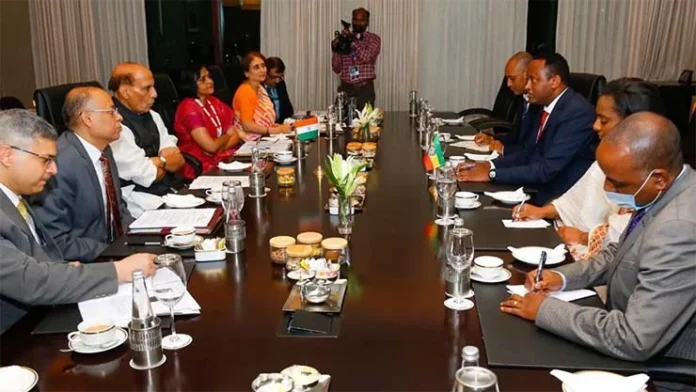Gandhinagar. The five-day 12th DefExpo 2022 slated to be the biggest ever so far began with the India-Africa Defence Dialogue (IADD) on the opening day October 18 to enhance cooperation in the fields of training and military exercises.
Defence Minister Rajnath Singh in his keynote address invited African nations to explore Indian defence equipment and technologies saying that robust Indian defence manufacturing ecosystem can fulfil international requirements.
“India and Africa are important stakeholders in ensuring a safe and secure maritime environment, especially in Indian Ocean Region,” Singh said adding that India does not believe in a hierarchical world order.
“Our international relations are guided by human equality and dignity,” he said.
“UN Security Council needs to be more representative for a sustaining global order wherein international peace, security and order are respected universally,” the minister said.
The dialogue successfully brought out various aspects of the IADD’s theme ‘Adopting Strategy for Synergizing and Strengthening Defence and Security Cooperation’.
Mr Singh defined the theme of IADD as the underlying commitment of India and African countries to explore new areas of convergence for defence engagements, including capacity building, training, cyber security, maritime security and counter terrorism.
He termed India and African countries as important stakeholders in ensuring a safe and secure maritime environment, especially in the Indian Ocean Region.
The Minister said that the two sides work together in many regional mechanisms, which foster inclusive and constructive collaboration in dealing with shared security concerns and address common challenges to peace and prosperity.
Emphasising that India and Africa share a multi-faceted defence and security cooperation relationship, Singh reiterated India’s support to Africa to deal with challenges of conflict, terrorism and violent extremism.
“India remains united with African countries in their quest for peace, security, stability, growth and prosperity. Our partnership with Africa is centered on the ten guiding principles articulated by PM Modi during his address to Parliament of Uganda in 2018. He had clearly stated that Africa will be at the top of our priorities. We will continue to intensify and deepen our engagements with Africa. Apart from the goals of developmental, commercial and technological partnerships that India wants to forge with African nations, the statement also covered cooperation in strengthening capabilities in combating terrorism and extremism, supporting UN peacekeeping missions and work for open and free oceans,” he said.
The Minister described the Indo-African ties as multi-faceted covering economic, diplomatic and defence domains. He highlighted that India and Africa share a robust partnership, which is based on the cooperative framework of ‘SAGAR’ (Security and Growth for All in the Region), drawn upon the ancient ethos of ‘Vasudhaiva Kutumbakam’ (The World is One Family).
Singh invited African countries to explore Indian defence equipment and technologies, stating that India has emerged as a leading defence exporter in recent years.
“Peace, security and development are inter-related. Security is essential for enabling development in the region. We have created a robust public and private defence industry. A defence manufacturing ecosystem has been created in India which has the advantage of abundant technical manpower. Our defence industry can work with you to fulfil your defence requirements,” he told his African counterparts.
Defence Minister was of the view that India does not believe in a hierarchical world order where few countries are considered superior to others. He stated that India’s international relations are guided by the essence of human equality and dignity, which is a part of its ancient ethos.
“We do not believe in making or becoming a client or satellite state, and so, when we partner any nation, it is on the basis of sovereign equality and mutual respect. Forging relations comes naturally to India, as we work towards mutual economic development,” he said.
He reaffirmed India’s belief that the global world order deserves to be democratised further. Stating that the world’s multilateral forums should be reflective of the change in global realities, he stressed on the need to make the UN Security Council more representative which will provide it with greater legitimacy, thereby sustaining a global order wherein the principles of international peace, security and order are respected universally.
On India’s support to Africa during the COVID-19 pandemic, he appreciated the role played by the Indian Navy for exhibiting excellent capability and service through the Mission SAGAR initiatives, which helped provide timely supply of emergency medical supplies, besides deploying medical expert teams for training and assistance.
“India has been the first responder in providing Humanitarian Assistance and Disaster Relief to several African countries,” he added.
Rajnath Singh also elaborated on the history of political, economic and cultural linkages between India and Africa, saying that the feeling of solidarity, mutual trust and confidence born in the days of colonialism continues to drive the cooperation. He added that India has been one of the strongest advocates of African decolonisation and has worked for the end of racist and apartheid regimes of the past.
The Gandhinagar Declaration proposes to enhance cooperation in the field of training in all areas of mutual interest by increasing training slots and deputation of training teams, empowerment and capability building of the defence forces of Africa, participation in exercises and humanitarian assistance during natural disasters.
India offered fellowship for experts from African countries through Manohar Parrikar Institute for Defence Studies and Analysis.
Fifty African countries, including 20 Defence Ministers, seven CDS and Service Chiefs and eight Permanent Secretaries participated in the Dialogue attesting to the high priority accorded to India-Africa engagement in defence and security.
Apart from the IADD, on the sidelines, the Defence Minister and the Minister of State for Defence Ajay Bhatt met with the visiting African Ministers where issues related to defence and bilateral relations were discussed.
The IADD showcased to the African nations the growing prowess of the domestic defence industry, which is one of the major drivers of the nation’s resolve to achieve ‘Make in India, Make for the World’ as envisioned by the Prime Minister. This interaction is expected to help fulfil the Defence requirements of India’s African partners as also achieving the objective of catering to domestic requirements. A Special Cover on IADD and a book on ‘India-Africa Defence Cooperation: Opportunities and Challenges’ were released during the event.
The IADD was institutionalised to be held biennially during successive DefExpos. It seeks to build on the existing defence partnerships between African countries and India and to explore new areas of convergence for mutual engagements including areas such as capacity building, training, cyber security, maritime security and counter-terrorism.
Mr Singh held bilateral meetings with his counterparts from Rwanda, Armenia and the Maldives who are attending the DefExpo. In the course of the meetings, he met with Minister of Defence, Rwanda, Major General Albert Murasira, Minister of Defence of Armenia Suren Papikyan and Minister of Defence of the Maldives Ms Mariya Ahmed Didi.
The entire spectrum of defence cooperation was discussed during the meetings, with focus on identifying avenues to expand mutually beneficial collaboration with the respective countries.
– The writer is a senior journalist and media consultant. The views expressed are of the writer and do not necessarily reflect the views of Raksha Anirveda.






